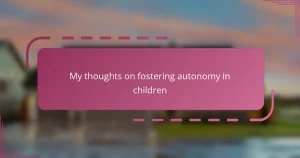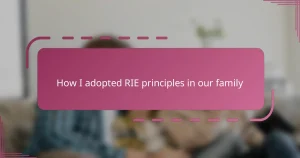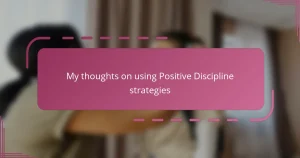Key takeaways
- Conscious parenting emphasizes self-awareness and being present, fostering deeper emotional connections with children.
- Responding with empathy and creating “pause moments” can transform potential conflicts into constructive conversations.
- Daily rituals, like morning check-ins and bedtime reflections, enhance trust and open communication between parent and child.
- Consistency and patience are crucial; acknowledging challenges without harsh judgment promotes personal growth and stronger relationships.
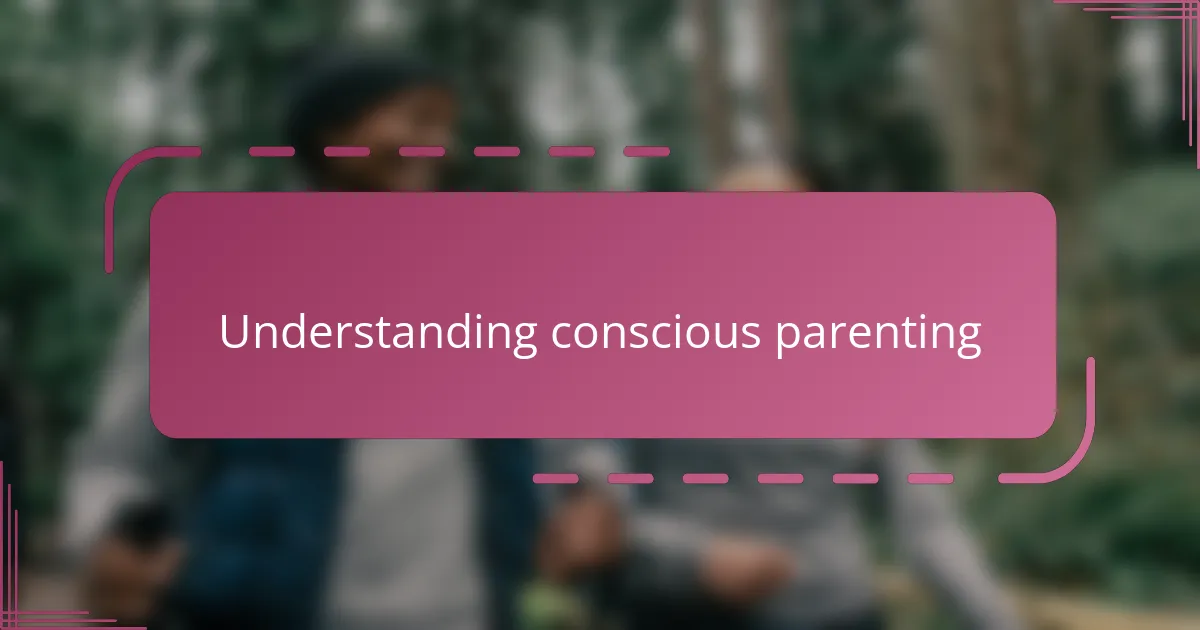
Understanding conscious parenting
Conscious parenting, to me, means being fully present with my child—not just reacting, but truly understanding the feelings beneath their actions. Have you ever caught yourself responding automatically and then wished you had paused? That moment of awareness is where conscious parenting begins.
What struck me emotionally was realizing how often I judged my child’s behavior without considering what they were experiencing inside. It challenged me to shift from frustration to curiosity, transforming our interactions into meaningful conversations rather than power struggles.
I find myself constantly asking, “How can I respond with empathy instead of control?” This question grounds me and helps me foster a deeper connection, reminding me that parenting isn’t about perfection but about evolving alongside my child.
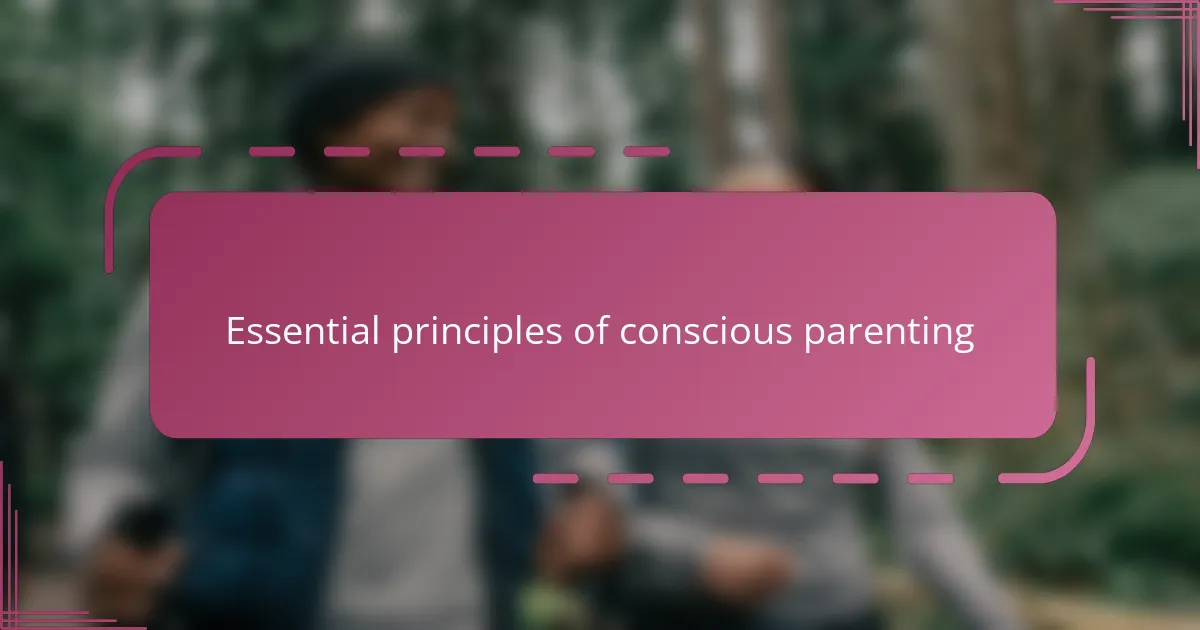
Essential principles of conscious parenting
One essential principle I’ve embraced is self-awareness. I noticed that when I stay aware of my own emotions, it’s easier to respond calmly rather than react out of frustration. Have you ever realized that your child’s outburst is sometimes a mirror reflecting your own stress? That insight changed how I handle tough moments.
Another core idea is presence. It’s challenging in our busy lives, but when I truly slow down and focus on my child, even for a few minutes, the quality of our connection skyrockets. I remember a day I put away my phone and just listened—no distractions—and suddenly, the small worries they shared felt huge to them, and I could offer real comfort.
Lastly, I’ve learned that conscious parenting requires patience and compassion, both for my child and myself. Mistakes are inevitable, but I try to see them as opportunities to grow rather than failures. How often do we forgive others but hold ourselves to impossible standards? Giving myself that grace has made this journey so much more fulfilling.
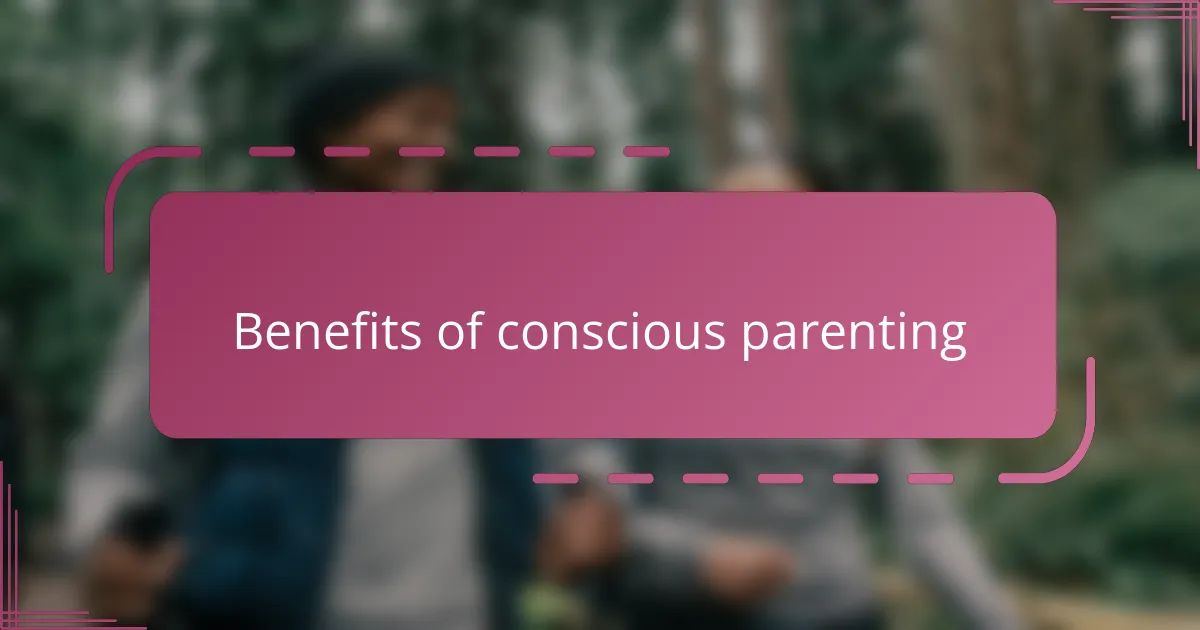
Benefits of conscious parenting
What I’ve found most rewarding about conscious parenting is the way it deepens our emotional bond. When I respond with awareness and empathy, my child feels truly seen, which transforms ordinary moments into something meaningful. Have you noticed how a simple shift in attitude can turn a meltdown into a chance for connection?
Another benefit that really surprised me is how much calmer our household became. By staying present and patient, I stopped fueling conflict with my own frustration. It’s amazing how my own mindset changed the atmosphere—I felt more in control, and so did my child.
Perhaps the biggest gain has been the growth I see in myself. Conscious parenting pushed me to confront my own triggers and develop greater emotional resilience. Isn’t it fascinating how parenting can be such a powerful mirror for our own self-awareness and personal growth?
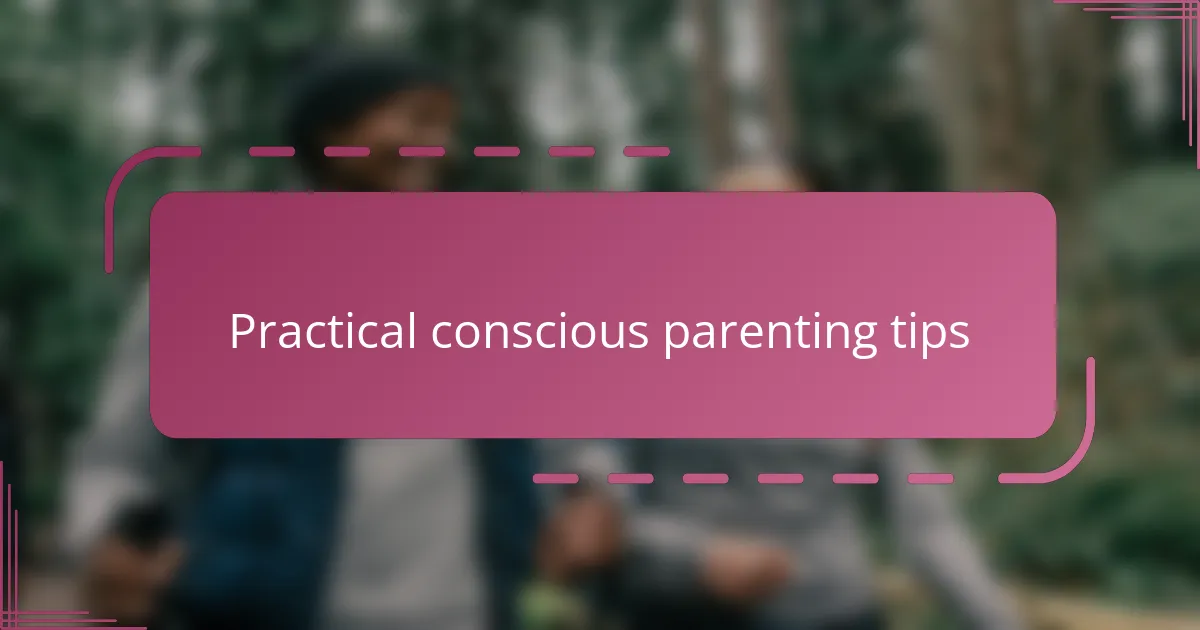
Practical conscious parenting tips
One practical tip I’ve found invaluable is creating “pause moments” during heated situations. Instead of reacting instantly, I take a deep breath and ask myself what my child might be feeling beneath their behavior. Have you tried this? It’s amazing how just a few seconds can shift a tense exchange into something more constructive.
Another approach that really helped me was setting aside dedicated one-on-one time without distractions. I remember scheduling short, regular sessions just to play or talk, and that simple act of focused attention made my child open up in ways I hadn’t seen before. It made me realize that sometimes, conscious parenting is less about big gestures and more about showing up consistently.
Lastly, I’ve learned to use reflective language to validate my child’s emotions, saying things like, “It sounds like you’re feeling upset because…” rather than immediately correcting or dismissing. This small change encourages dialogue and trust. Have you noticed how kids respond when they feel truly heard? It’s a powerful way to nurture emotional intelligence and connection.
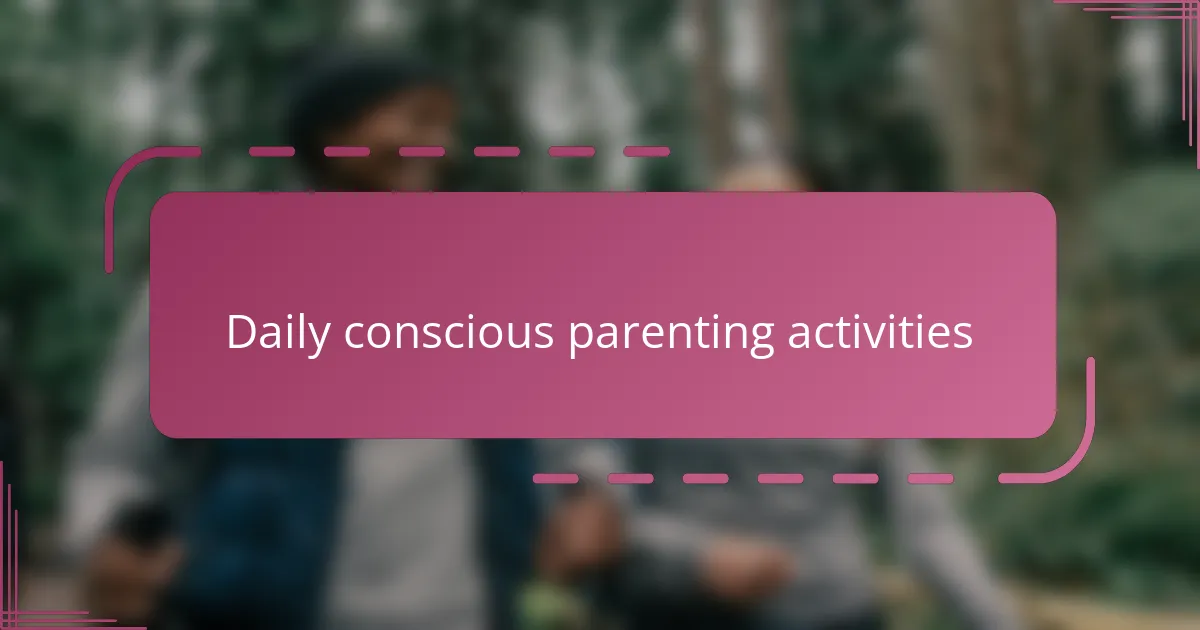
Daily conscious parenting activities
Every morning, I make it a point to connect with my child before the day rushes us away. Just a few minutes of genuine eye contact and asking, “How are you feeling this morning?” seems to set a gentle tone for both of us. Have you ever noticed how starting the day with presence can soften even the toughest moments later on?
Throughout the day, I try to catch myself before reacting—especially when my child’s behavior pushes my buttons. Pausing to breathe and wonder what’s behind their actions has changed many potential conflicts into conversations. It’s not always easy, but this habit helps me stay grounded and responsive rather than reactive.
At bedtime, our routine becomes a small but powerful ritual of connection. Sharing what went well and what felt hard today creates space for honesty and affection. I’ve seen how this simple daily practice encourages my child to open up and feel safe, reinforcing the trust between us. Have you tried ending the day this way? It truly makes a difference.
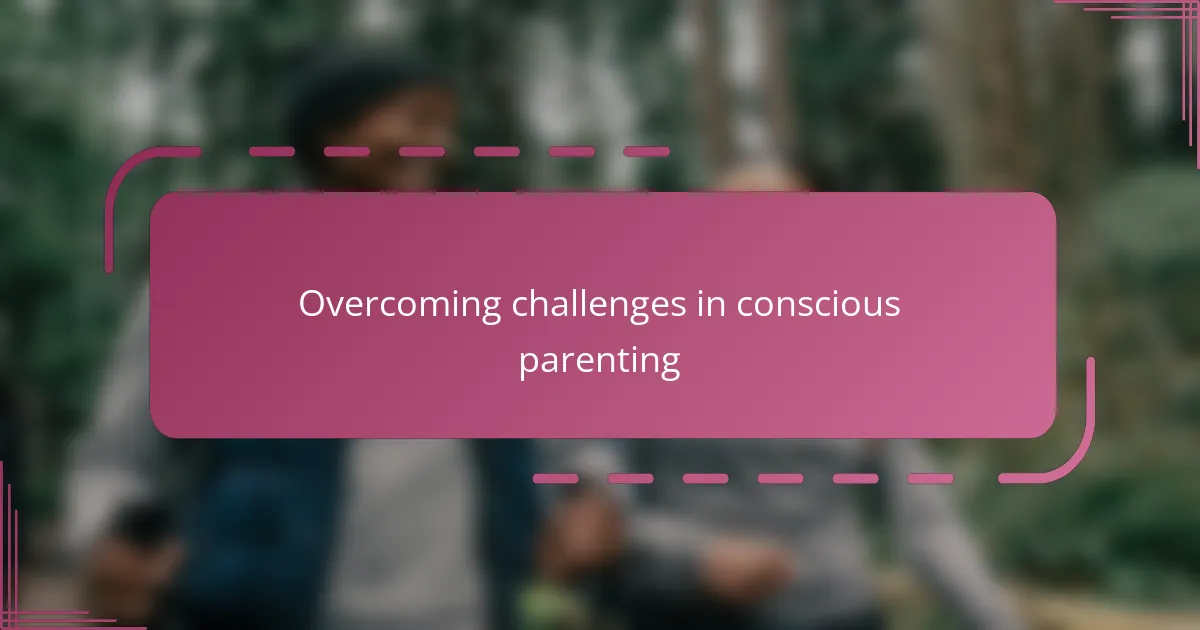
Overcoming challenges in conscious parenting
Challenges in conscious parenting have definitely tested my patience more times than I’d like to admit. There were moments when despite my best intentions, old habits of reacting instinctively took over. Have you ever felt like your efforts were just not enough, especially when emotions run high? I learned that acknowledging these slip-ups without harsh judgment is the first step toward overcoming them.
One particular challenge was managing my own emotional triggers while staying present for my child’s needs. It’s easier said than done to pause, breathe, and respond thoughtfully when you’re exhausted or stressed. I found that building small rituals of self-care—like a few quiet moments before interacting—helped me reset and show up more calmly. It made me realize that taking care of myself is not selfish but essential for conscious parenting.
Sometimes, the hardest part was staying consistent when immediate results weren’t visible. Patience felt like a scarce resource, and doubt crept in—was I really making a difference? Reflecting on small breakthroughs, like a meaningful conversation or a shared laugh after a tough day, reminded me that progress is often quiet and gradual. Have you noticed how gentle persistence often leads to deeper connections over time? That insight kept me going when challenges felt overwhelming.
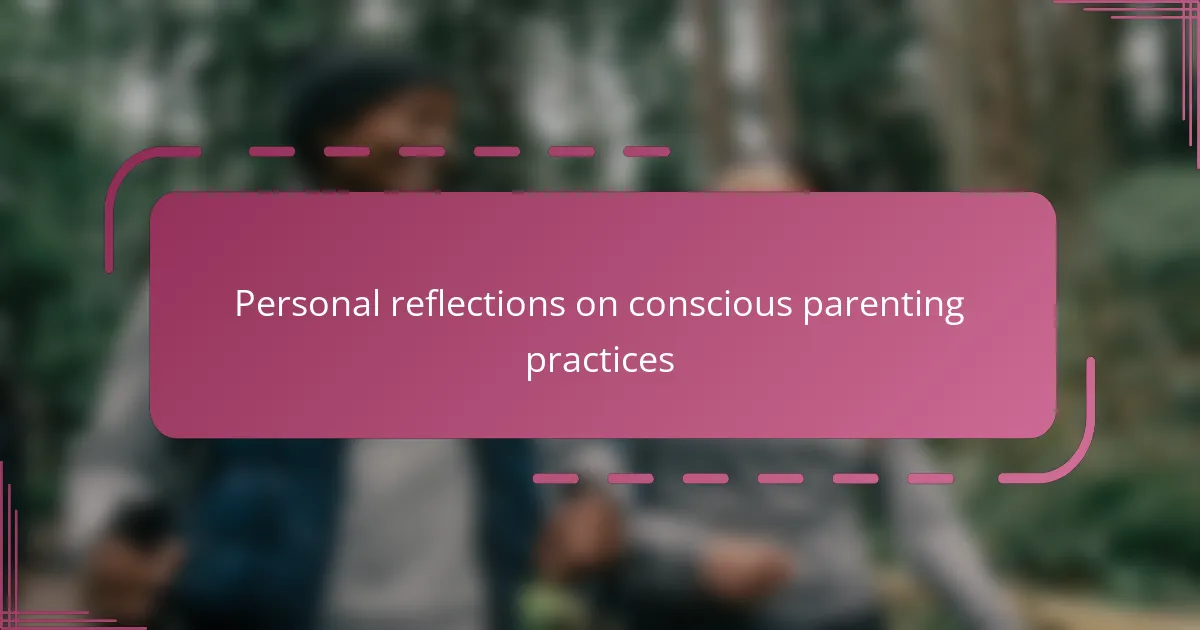
Personal reflections on conscious parenting practices
There have been times when conscious parenting felt like trying to learn a new language fluently—frustrating yet deeply rewarding. I remember a day when my child was upset, and instead of rushing to fix things, I simply sat with them in silence, which surprisingly became the most comforting moment for both of us. Has it ever surprised you how presence alone can sometimes heal more than words?
Reflecting on my journey, I realize conscious parenting asked me to confront my own imperfections head-on. It wasn’t always about getting it right but about being willing to grow alongside my child. This approach shifted my mindset from seeking control to embracing connection, which felt like a breath of fresh air amid the chaos of daily life.
One lesson that sticks with me is that conscious parenting demands continual self-reflection. When I pause and ask myself, “What am I really feeling right now?” I often uncover hidden stress or fears influencing how I respond. Recognizing this has helped me respond with more patience and compassion—not just for my child, but for myself as well. Have you noticed how understanding your own feelings changes the entire dynamic at home?
